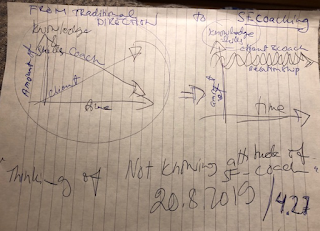Dear Readers,
The aim of this blog is to share my learning experiences, how I'm trying to find my way to
become a better leader by using solutions focused methods in my work and also,
how could I evaluate my solution focused leadership style.
These two questions do not leave me alone.
become a better leader by using solutions focused methods in my work and also,
how could I evaluate my solution focused leadership style.
These two questions do not leave me alone.
I have been working over 20 years as a director in educational organisations. I am also a
psychotherapist, which uses a solution focused working methods. About three years ago, I noticed
that the same solution focused methods are nowadays also used in organisation development, called
solution-focused coaching (SFiO 2019).
In August 2019, I participated for one week Solutions Focused Retreat in Switzerland with 30
coaches from 10 countries in Europe. After that, I became more interested in using the
solution-focused methods also as part of my leadership style as a Director of Lifelong Learning
in the university context.
psychotherapist, which uses a solution focused working methods. About three years ago, I noticed
that the same solution focused methods are nowadays also used in organisation development, called
solution-focused coaching (SFiO 2019).
In August 2019, I participated for one week Solutions Focused Retreat in Switzerland with 30
coaches from 10 countries in Europe. After that, I became more interested in using the
solution-focused methods also as part of my leadership style as a Director of Lifelong Learning
in the university context.
I have noticed that the research results combine both the positive (Braunstein & Grant 2019, Grant & O’Connor 2010
and Hicks & McCracken 2010) and also critical views (Grant & O'Connor 2018) considering
the use of solution focused approach in coaching. I am acting kind of action researcher; reading
evidence based articles, follow SFiO on Facebook, LinkedIn and YouTube, follow Elfie and Dominic
on their SF Tour . They have fantastic SF-podcasts, which I love listen while taking my SF- friend
Jomppa-the-lab for long walks.
I am in the begin on my way of using solution focused coaching as part of my leadership. I struggle,
how could I have a solution focused mindset in everyday situation, where I am involved in
my work.
and Hicks & McCracken 2010) and also critical views (Grant & O'Connor 2018) considering
the use of solution focused approach in coaching. I am acting kind of action researcher; reading
evidence based articles, follow SFiO on Facebook, LinkedIn and YouTube, follow Elfie and Dominic
on their SF Tour . They have fantastic SF-podcasts, which I love listen while taking my SF- friend
Jomppa-the-lab for long walks.
 |
| SF-Jomppa- the- lab taking me for long walks |
I am in the begin on my way of using solution focused coaching as part of my leadership. I struggle,
how could I have a solution focused mindset in everyday situation, where I am involved in
my work.
Here are some of
my observations from my learning path in the end of August and begin of
September, how I act or use SF- framework as a mindset:
One- to- One-
Discussions as a Psychotherapist
I work as a
volunteer psychoterapist in elderly care. When I act as a psychoterapist,
it is easy for me to take a role of SF- mindset. I think before the meeting;
observe and listen more, speak less, remember miracle & scale
questions, be curious, give compliments, where are the small steps, future talk,
do more, what works and SO ON... and I feel home in that role.
One- to- One-
Discussions as a Coach/Director or a Group Leader in My Work
I wonder, why
this SF- mindset does not come so naturally in work situations like it comes,
while I'm acting as a SF-psychoterapist. Perhaps in work situations I am
focusing more to the content of meetings than to the communication of meetings.
I think the trend is that the business running is always more important than the
way the communication appears in group situations. Participants (me too) are
presenting issues that are linked to other people speech and interaction is
very quickly in group situations. While I am a participant of the group, I just
act/communicate in a situation and later comes the reflection time, when I'm
trying figure out, what just happened.
Dear reader of
this blog, what do you think. Why is it difficult to transfer my
SF-communication skills from one situation to the another situation?
Key Words: Solution focused coaching, leadership
References:
Braunstein, K. & Grant, A. M. 2016. Approaching solutions or avoiding problems? The differential effects
of approach and avoidance goals with solution-focused and problem-focused coaching questions.
Coaching; London Vol. 9, Iss. 2, (Sep 2016): 93-109.
of approach and avoidance goals with solution-focused and problem-focused coaching questions.
Coaching; London Vol. 9, Iss. 2, (Sep 2016): 93-109.
Grant, A. M. & O'Connor, S. A. 2018. Broadening and building solution-focused coaching: feeling good
is not enough. Coaching Sep 2018, Vol.11(2), pp.165-185.
is not enough. Coaching Sep 2018, Vol.11(2), pp.165-185.
Grant, A. M. & O'Connor, S. A. 2010. The differential effects of solution-focused and problem-focused
coaching questions: a pilot study with implications for practice. Industrial and Commercial Training;
Guilsborough Vol. 42, Iss. 2, (2010): 102-111.
coaching questions: a pilot study with implications for practice. Industrial and Commercial Training;
Guilsborough Vol. 42, Iss. 2, (2010): 102-111.
Hicks, R. & McCracken, J. 2010. Solution-Focused Coaching. Physician Executive; Tampa Vol. 36,
Iss. 1, (Jan/Feb 2010): 62-4.
Iss. 1, (Jan/Feb 2010): 62-4.

